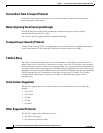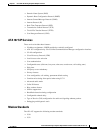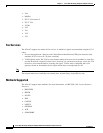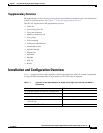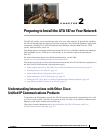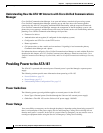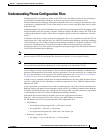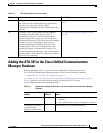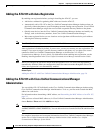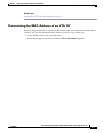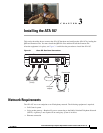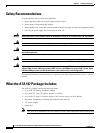
2-4
Cisco ATA 187 Analog Telephone Adaptor Administration Guide for SIP (Version 1.0)
OL-21862-01
Chapter 2 Preparing to Install the ATA 187 on Your Network
Understanding the ATA 187 Startup Process
–
No support > for configuring termination key
–
No support + dial pattern which contains + will be ignored
–
Maximum length of match string is 196
–
Maximum length of a dial pattern is 4095
–
Maximum rule set in one dial pattern is 100
The filenames are derived from the MAC Address and Description fields in the Phone Configuration
window of Cisco
Unified Communications Manager Administration. The MAC address uniquely
identifies the phone. For more information see the Cisco Unified Communications Manager
Administration Guide.
For more information about how the phone interacts with the TFTP server, see the Cisco Unified
Communications Manager System Guide,
Cisco TFTP section.
Understanding the ATA 187 Startup Process
When connecting to the VoIP network, the ATA 187 goes through a standard startup process, as described
in
Table 2-1. Depending on your specific network configuration, not all of these process steps may occur
on your ATA 187.
Ta b l e 2-1 ATA 187 Startup Process
Task Purpose Related Topics
1. Obtaining Power.
The ATA 187 uses external power.
See Providing Power to the ATA 187, page 2-2.
2. Loading the Stored Image.
The ATA 187 has non-volatile flash memory in which it
stores firmware images and user-defined preferences. At
startup, the phone runs a bootstrap loader that loads a
phone image stored in flash memory. Using this image, the
phone initializes its software and hardware.
3. Obtaining an IP Address.
If the ATA 187 is using DHCP to obtain an IP address, the
device queries the DHCP server to obtain one. If you are
not using DHCP in your network, you must assign static IP
addresses to each device locally.
4. Requesting the CTL file.
The TFTP server stores the CTL file. This file contains the
certificates necessary for establishing a secure connection
between the device and Cisco Unified
Communications
Manager.
See the Cisco Unified Communications Manager
Security Guide,
Configuring the Cisco CTL
Client.



